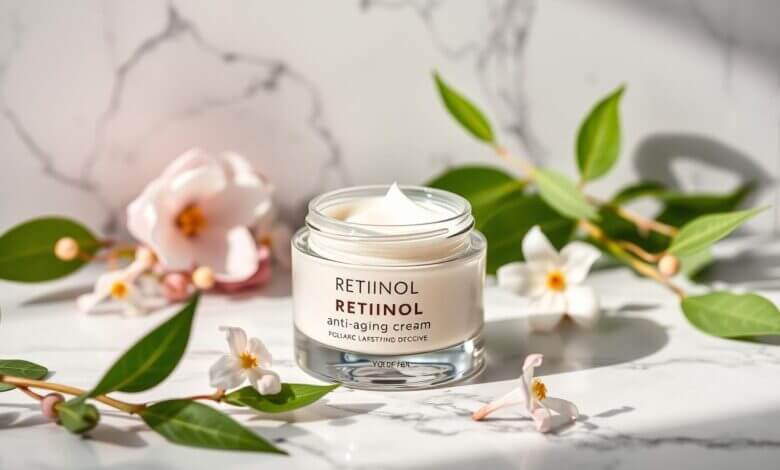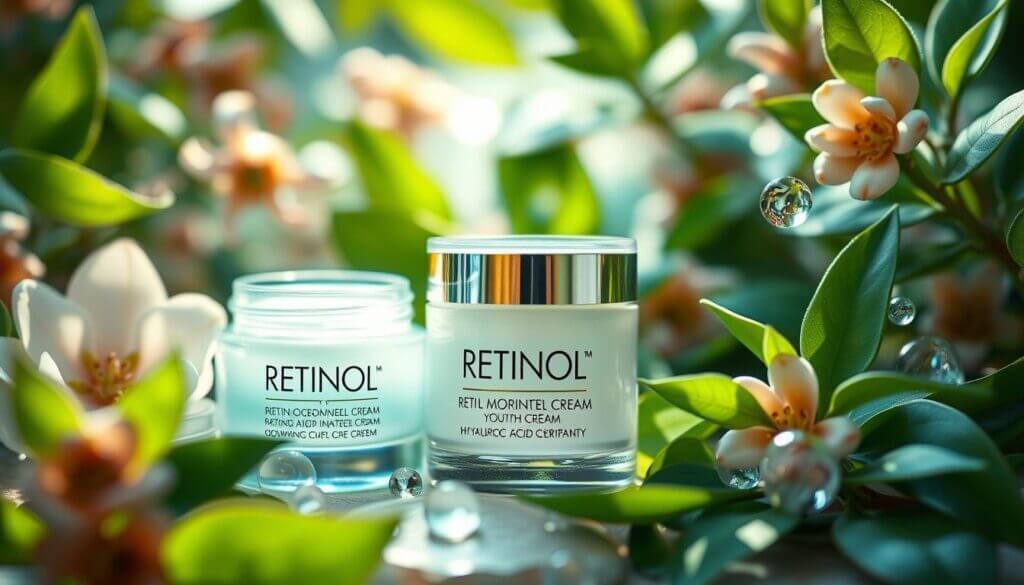Best Retinol Anti-Aging Creams for Youthful, Radiant Skin
How Retinol Creams Can Transform Your Skin: Expert Tips and Top Picks

Did you know over 10 retinol-based anti-aging creams came out last year? They promise to change your skin for the better. Retinol, a strong form of vitamin A, is known for its amazing effects on aging skin. This guide will show you how retinol can help you look younger and more radiant in 2024.
Key Takeaways
- Retinol is a powerful anti-aging ingredient that can smooth fine lines, improve skin texture, and fade dark spots
- The price range for retinol products varies significantly, from $22 for drugstore options to $350 for luxury brands
- Retinol concentrations in products range from 0.3% to 1.25%, with higher percentages providing more potent results
- Retinol can be used to address a variety of skin concerns, including acne, dryness, and uneven tone
- Incorporating retinol into your routine requires a gradual approach to avoid potential irritation
What is Retinol?
Retinol is a strong form of vitamin A. It has been a key ingredient in anti-aging skincare for many years. First seen in over-the-counter creams in the 1970s, it’s now known for making skin look younger.
Retinol boosts collagen production in the skin. This reduces wrinkles and makes skin more elastic. It comes in creams, gels, and liquids, each with different strengths.
Most people find retinol safe, but start with a low concentration, like 0.05%. Gradually increase the strength to avoid side effects like dryness and redness. These side effects usually go away as your skin gets used to it.
Retinol can help with many skin issues, like fine lines, wrinkles, age spots, and rough skin. But, always use it as directed and remember to use sun protection. Retinol can make your skin more sensitive to the sun.
With patience and careful use, retinol can be a big help in getting younger-looking skin. Add it to your skincare routine and see the difference for yourself.

Benefits of Using Retinol
Retinol will significantly improve your skin. It is said to eliminate fine lines and wrinkles. It helps you get fairer-looking skin; say goodbye to dark spots.
Reduces fine lines and wrinkles.
Reduces the appearance of fine lines and wrinkles: Vitamin A, retinol! It is good for acne, scars, and stretch marks. This ensures that your skin is elastic and keeps you looking young.
Enhances skin texture and luminance admissible.
Retinol increases skin cell turnover for a more radiant appearance. It opens the pores and makes your skin glow. But you may notice it takes a couple of weeks to see the difference.
Reduces the appearance of dark spots and hyperpigmentation.
It can do wonders for dark spots and hyperpigmentation, which you are concerned about. It won’t happen overnight, but it works. Nor does it help to fade pesky melasma spots resulting from hormonal changes or sun damage. •Benefits: Fights inflammation; helps fade brown spots.
Go slow as they caution you about retinol, and always wear sunblock. It can help you achieve plump, healthy, and glowing skin.
| Retinol Benefit | Key Findings |
|---|---|
| Smooths Fine Lines and Wrinkles | – Topical retinoids can help treat acne, acne scars, and stretch marks – Slows down the breakdown of collagen and increases skin elasticity |
| Improves Skin Texture and Radiance | – Increases skin cell turnover for a more even, radiant complexion – Unclogs pores and promotes a brighter, more luminous glow |
| Fades Dark Spots and Hyperpigmentation | – Topical retinol can lighten dark spots, though results may take months – Helps fade melasma spots caused by increased melanin production |

If you can Incorporate Retinol in a Skin Care Routine
For sure, one of the biggest game changers in any skincare routine can tend to be retinol. Then offer to slowly raise the quantity. Play around with doing a little bit less and seeing what your skin responds to.
Use a pea-sized amount of retinol on your face. Do this two to three times a week in the evenings. Then, increase to daily use over a few weeks.
Retinol can be drying. Always follow it with a moisturizer to keep your skin hydrated and soothed.
And do not use retinol during the day; it increases your skin’s sensitivity to UV light. Make sure you diligently apply sunscreen as well.
Over time (you have to be patient and consistent), you will notice the effects of retinol. You should see skin that looks smoother, with fewer wrinkles and fine lines. It should have a more radiant glow.Remember, it may take up to 12 weeks to see results, so keep going and enjoy the process.
If you’re new to retinol or have sensitive skin, start with a gentler version. Try La Roche-Posay Redermic R or PCA Skin Retinol for Sensitive Skin. They’re both anti-aging treatments. These products are made to be less irritating but still work well.

Retinol can be a big help in your skincare routine, but use it right. Follow these tips and listen to your skin. This way, you can get the most out of retinol and look younger and healthier.
Recommended Retinol Anti-Aging Creams
Sup wanting some good, youthful, radiant skin, especially the retinol. It smooths fine lines, refines texture, and fades dark spots. There are many retinol creams. Picking one can be tough. Take a look at some of the best retinol creams for your skin type and concerns.
For Ageing: Lancer Advanced Retinol Treatment
Lancer Advanced Retinol Treatment PL3. If you have maturing skin with fine lines and deep wrinkles, try it. It contains 1% retinol. Skin looks smoother and plumper. This reduces fine lines and age spots. It also contains ingredients that keep the skin hydrated and calm it down, so it will not dry out or irritate.
BEST RETINOL FOR ACNE-PRONE SKIN: CeraVe Resurfacing Retinol Serum
Best for Acne-Prone Skin: CeraVe Resurfacing Retinol Serum. It has 0.3% retinol, ceramides, and niacinamide. It unclogs pores, reduces acne, and refines texture. Oil-free. It won’t clog pores or cause breakouts. A unique complex won’t leave skin oily. Perfect for your daily skincare routine.
RoC Retinol Correxion Line Smoothing Cream for Dry Skin – BUY ON AMAZON
If you have dry skin, retinol creams can make it even drier. Enter RoC Retinol Correxion Line Smoothing Cream. With a mild 0.1% retinol, it also includes hyaluronic acid and glycerin to counteract drying. So you have soft, vibrant skin that is not dried out.
No matter your skin type, a good retinol cream can help. You can add it to your routine. These formulas address everything from fine lines to acne, for your best skin ever.
Retinol vs Retinoids vs Tretinoin
Retinol, retinoids, and tretinoin get a lot of play in the skincare world as far as anti-aging goes. But they are not the same. They all bring their individual aspects that are important.
Retinol, which is a form of vitamin A, can be found in many skincare products. The skin must convert it to retinoic acid before it can function. Retinol ranges from 0.25% to 1%. It is thought to be a softer alternative that is recommended for people who have sensitive skin.
Retinoids are more powerful forms of vitamin A that can only be obtained with a prescription. These help to get the job done fast; however, they can be harsh on the skin. They come in different formulations, like gels, creams, and solutions. This depends on their strength.
Tretinoin is a prescription-grade retinoid. It not only decreases aging signs and rebuilds collagen but also reduces acne, as per the studies. It is, in fact, much stronger than retinol. It addresses serious skincare problems better.
| Ingredient | Strength | Availability | Effectiveness | Side Effects |
|---|---|---|---|---|
| Retinol | 0.25% – 1% | Over-the-counter | Moderate | Mild |
| Retinoids | Varies | Prescription | Strong | Moderate to Severe |
| Tretinoin | 0.01% – 0.1% | Prescription | Very Strong | Moderate to Severe |
Retinol, retinoids, and tretinoin all help with skin health but vary in strength, availability, and side effects. Knowing these differences can help you pick the best product for your skincare needs.
Ingredients to Avoid When Using Retinol
Retinol is a strong anti-aging ingredient that can greatly improve your skin. But, it’s important to be careful with the products you mix it with. Some ingredients can make retinol less effective or cause bad reactions.
Stay away from using retinol with ingredients like benzoyl peroxide, salicylic acid, and vitamin C. These can make your skin dry, red, and peel. This can be uncomfortable and not help your skincare goals.
- Benzoyl peroxide can reduce retinol’s anti-aging effects.
- Salicylic acid and retinol can over-exfoliate, causing irritation.
- Vitamin C and retinol might cancel each other out, reducing their benefits.
Use gentle ingredients like ceramides and hyaluronic acid with retinol. These help keep your skin moisturized and reduce irritation.
Start with a low retinol concentration and slowly increase use. This lets your skin adjust. If you have sensitive skin or use strong retinoids, talk to a dermatologist.
Avoid certain ingredients to avoid with retinol for the best results. A gentle, well-thought-out routine can help you get the glowing, youthful skin you want.
When to Use Retinol
For sure, your number one ingredient in fighting the signs of aging has to be retinol. The secret to glowing, fresh skin comes down to knowing when you should use it.
Use retinol in your 20s to avoid the signs of aging. It helps with acne too. They also come in many forms: creams, lotions, thick serums, gels, and oils for oily skin.
Their advice: Begin with a gentle retinol to lessen the chance of irritation. It helps to make skin soft and to keep it from losing moisture, and it may help to reduce wrinkles. It works for dark spots and blackheads as well.
However, retinol is an irritant, so it can cause redness, dryness, and peeling. In extreme cases, it can cause blistering and swelling. It can also cause serious skin problems, like eczema or discoloration. Be careful with it.
Roll in retinol before bed, and follow up with moisturizer. Use sunscreen during the day. Use it 1-2 times a week and increase it as tolerated.
These benefits of retinol take time to work on the skin. We know less about how long to wait for it to work. As such, you can have younger-looking and fresh skin.
Pin Retinol Anti-Aging Creams Credit: Getty Images Ultimate Guide
It may seem difficult to know, but fear not; we have the best retinol anti-aging cream just for you. So this guide is to get you that glowing, youthful skin. Retinol (vitamin A) is a strong anti-aging agent. It fights fine lines and wrinkles.
Retinol increases cell turnover so that your skin grows faster. This causes your skin to be firmer and less wrinkled. It also brightens your skin and removes dark spots and patches.
Begin incorporating retinol into your skincare gradually and wait. Start off using limited amounts and increase the amount as your skin adjusts. Choose ingredients with moisturizing or hydrating benefits, like hyaluronic acid and niacinamide. They prevent dryness and red skin.
We’ve picked the best retinol creams for different skin types and issues:
- For Mature Skin: Lancer Advanced Retinol Treatment
- For Acne-Prone Skin: CeraVe Resurfacing Retinol Serum
- For Dry Skin: RoC Retinol Correxion Line Smoothing Cream
Being consistent with retinol is crucial for seeing results. Stick to your skincare routine and let your skin adjust. Soon, you’ll have a younger, brighter look.
Conclusion
This guide has shown you retinol’s great anti-aging benefits for skincare. It reduces fine lines and wrinkles, fades dark spots, and brightens skin. Retinol is a strong tool in your fight for youthful, glowing skin.
Real stories and facts show that retinol. It boosts collagen, speeds up skin renewal, and solves skin issues. You now know how to use retinol correctly to get the best results without side effects.
Now, you have the knowledge to pick the best retinol cream for your skin. These retinol products can help with wrinkles, acne, and dull skin. They can help you reach your skin goals in 2024 and beyond.
FAQ
What is retinol and what are its benefits?
Retinol is a strong type of vitamin A found in skincare products since the 1970s. It’s known for smoothing fine lines and wrinkles, enhancing skin texture, and reducing dark spots.
How do I incorporate retinol into my skincare routine?
Start with retinol slowly and increase its use as your skin gets used to it. Use a small amount at night, starting with 1-2 times a week. Then, you can use it every night.
What are some of the best retinol anti-aging creams and serums?
Top retinol products include Lancer Advanced Retinol Treatment for mature skin, CeraVe Resurfacing Retinol Serum for acne-prone skin, and RoC Retinol Correxion Line Smoothing Cream for dry skin.
What’s the difference between retinol, retinoids, and tretinoin?
Retinol is an over-the-counter vitamin A that turns into retinoic acid in the skin. Retinoids are stronger, prescription-strength vitamin A that work faster but can be harsher. Tretinoin is a prescription retinoid.
What ingredients should I avoid when using retinol?
Avoid mixing retinol with harsh ingredients like benzoyl peroxide, salicylic acid, and vitamin C. These can make your skin dry, red, and peel. Instead, use gentle ingredients like ceramides and hyaluronic acid.
When is the best time to use retinol?
Use retinol at night because it makes your skin more sensitive to sunlight. Apply it in the evening, moisturize after, and wear sunscreen during the day.
Read More > Best Detangling Brush: Why the Unbrush is Perfect for All Hair Types
Read More > Top 10 Frizz Control Hair Products for Every Hair Type
Read More > Whipped Argan Oil: Expert Tips & Where to Find the Best Quality
Read More > 10 Haircare Miracle Leave-In Products for Every Hair
Read More > 10 Best Women’s Fragrance Gift Sets to Captivate & Delight




